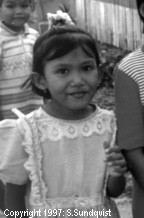Mori Atas in Indonesia

Photo Source:
Bethany World Prayer Center
|
Send Joshua Project a map of this people group.
|
| People Name: | Mori Atas |
| Country: | Indonesia |
| 10/40 Window: | Yes |
| Population: | 22,000 |
| World Population: | 22,000 |
| Primary Language: | Mori Atas |
| Primary Religion: | Christianity |
| Christian Adherents: | 95.00 % |
| Evangelicals: | 7.00 % |
| Scripture: | New Testament |
| Ministry Resources: | Yes |
| Jesus Film: | Yes |
| Audio Recordings: | Yes |
| People Cluster: | Bungku-Bajau |
| Affinity Bloc: | Malay Peoples |
| Progress Level: |
|
Introduction / History
Sulawesi, one of the major islands of Indonesia, is home to the Mori (also known as the Aikoa). Sulawesi is a large, crab-shaped island that is generally mountainous and marked by volcanic cones. Tropical rainforests cover most of the land up to 1,000 feet in elevation, with dense forests found at higher altitudes. These geographic features isolate people and result in many individuals groups.
Traditionally, the Mori went on headhunting raids against their enemies. Until as recently as 1905, headhunting was a common practice.
What Are Their Lives Like?
Mori villages are constructed with the village temple at the center. The Mori exhibit strong loyalty to their tribe, which consists of several villages sharing a common "mother" village. When one village is endangered, it becomes the responsibility of the other tribal members to protect it. While agriculture serves as the primary means of livelihood in the region, ironwood and ebony also hold significant value as commodities.
Most of the Mori live in houses that have only a sleeping room and a large living room. The living room, which may also serve as the kitchen, usually contains a rectangular hearth filled with clay and ashes. These houses often stand on stilts about 1.8 meters (6 feet) high. The space underneath is used for cattle stalls or chicken coops or to store tools and firewood. The floors and walls are made of timber or flattened bamboo. The roofs are covered with either clay tiles or thatch made out of palm leaves.
Most of the Mori are wet rice farmers, although they also grow maize, tobacco and coffee for export. Some Mori are blacksmiths who are particularly skilled at making swords. Their primary diet consists of fish, rice and maize.
Within the Mori tribes, aristocratic rulers head up the political hierarchy, with elders leading local "kin groups." These rulers were once thought to be divine, but this belief has faded over the years.
The Mori are a very festive people and are famous for their traditional dances. Their art forms, such as wood carvings and weaving, are also well known. A colorful skirt called a sarong is typically worn by both the men and women.
What Are Their Beliefs?
Though most Mori identify as Christians, they blend faith in Christ with traditional beliefs in the spirit world. Some of their deities are associated with smallpox, rice, air and fate. When an important person dies, his bones are cleaned and put into caves at the tewusa or death feast. Then every three to five years, another ceremony called the “woke" is held to honor these deceased ancestors. Here, the bones of the honored dead are removed from the caves, rewrapped and buried. Such ceremonies are usually conducted by a priestess who has a familiar spirit.
What Are Their Needs?
The Mori, a people whose lives and worship center around the dead, must be shown the life-giving power of the gospel. Their focus must be turned toward life, which can only be found in Jesus Christ. They need good, solid Bible teaching to turn their hearts to the Risen Savior.
Prayer Points
Ask God to raise up workers who are culturally sensitive to the Mori and who can effectively minister the gospel.
Pray that God will strengthen, encourage and protect Christ followers among the Mori.
Ask the Holy Spirit to give Indonesian churches a burden to reach their Muslim neighbors.
Pray that the Lord will raise up a strong church among the Mori that will plant Muslim fellowships for Muslim background believers.